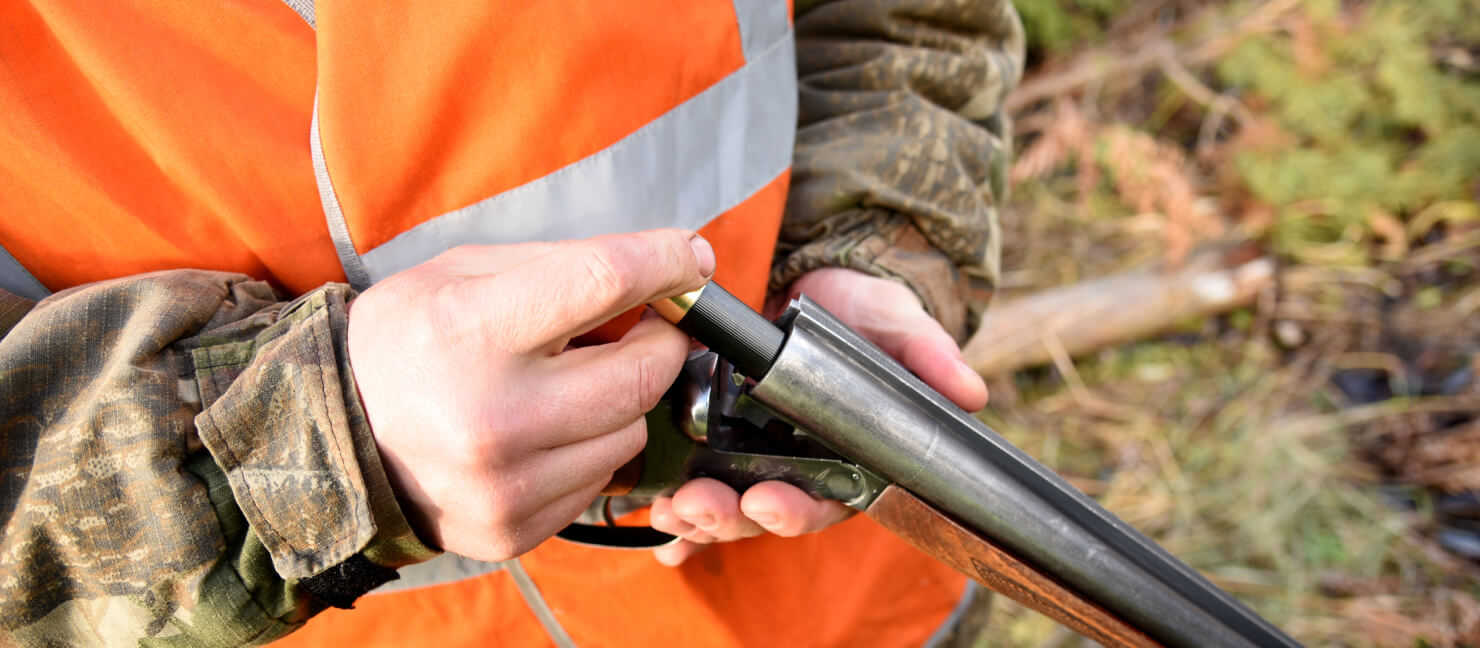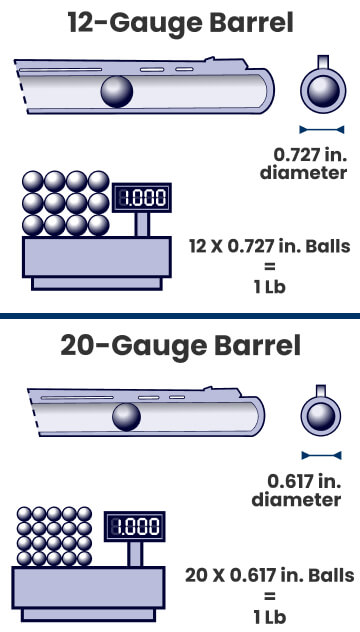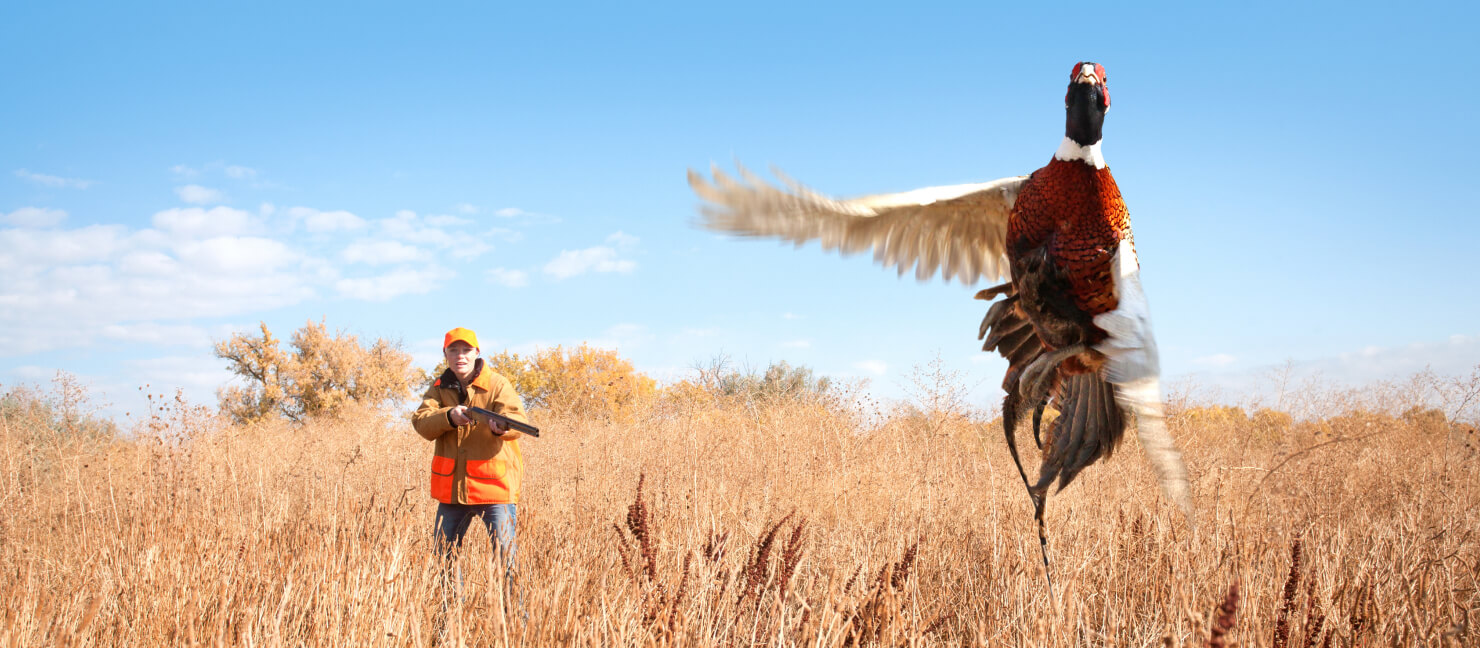
20 Gauge vs 12 Gauge: What’s the Difference?

Stuck between choosing a 12 gauge & 20 gauge shotgun? They are the two most popular types of shotguns currently available on the market, and each has its own features and purposes to consider. In this guide, we’ll compare 12 gauge vs 20 gauge shotguns and cartridges so you can make the right choice.
Key Takeaways
- What Does Gauge Mean in Shotguns? — ‘Gauge’ is the diameter of a shotgun’s bore or barrel. It determines what shotgun shell sizes you can use.
- 20 Gauge vs 12 Gauge: What’s the Difference? — Discover the key differences between 12-gauge and 20-gauge shotguns.
- How to Use a 20 Gauge vs 12 Gauge — Learn which shotgun is best for different hunting activities and home defense.
- 12 vs 20 Gauge Shotgun: Which is Better for Beginners? — 20-gauge shotguns tend to be best for beginners because they are lighter and produce less recoil.
What Does Gauge Mean in Shotguns?
The term 'gauge' refers to the diameter of the shotgun's bore or barrel. A shotgun gauge is tied to the size of the shotgun shells, with a higher gauge number corresponding to a smaller shot size.

- In a 12-gauge shell, 12 pellets would weigh the same as 1 pound of shot. In a 20-gauge shell, 20 pellets would be required. However, the .410 shotgun is actually a 67 gauge due to its unique bore size.
- A 12-gauge shotgun has a larger bore diameter than a 20-gauge shotgun.
- The gauge also influences the number of pellets of equal size and weight that are needed to make up one pound of shot.
20 Gauge vs 12 Gauge: What's the Difference?
Learn the key differences between a 12 gauge and 20 gauge shotgun so you can make the best buying decision for your hunting needs.
| 20 Gauge vs 12 Gauge Overview | ||
|---|---|---|
| Factors | 20 Gauge | 12 Gauge |
|
Versatility |
Limited to #1 or smaller buck pellets |
Can hold buckshot shells as large as #000 |
|
Recoil |
Produces 11-31 lbs. of recoil energy |
Produces 17-54 lbs. of recoil energy |
|
Power |
Smaller projectiles for less effective shooting power at close range |
Bigger projectiles for more effective shooting power at longer distances |
|
Shot Pattern |
Looser, less effective patterns |
Larger, more effective patterns |
|
Use Cases |
Mostly used for hunting upland birds |
Best for waterfowlers, turkey (at far ranges), mid to big-sized game |
|
Accuracy |
Less accurate shots at greater distances |
More accurate shots at greater distances |
|
Shootability |
More comfortable |
More painful |
12 Gauge vs 20 Gauge: Versatility
Overall, the 12-gauge shotgun offers more versatility than a 20-gauge shotgun because it has increased shell capacity and the ability to accommodate larger buckshot shells (up to a #000 size). Because both shotguns are commonly used, their ammunition is highly available and typically costs between $8 and $20 for a box of five shells.
The 12 gauge delivers a denser shot pattern and is better for longer distances.
The 20 gauge shotgun is more specialized. It’s limited to #1 or smaller buckshot pellets.
A 20-gauge shotgun has a lighter weight and reduced recoil — making it a suitable choice for certain shooting applications.
12 Gauge vs 20 Gauge: Recoil
Various factors influence a shotgun’s recoil, including projectile weight, projectile speed, and weapon weight.
Due to its larger powder charge and heavier projectiles, a 12-gauge shotgun generally produces more recoil than a 20-gauge shotgun.
The force generated by recoil can potentially lead to discomfort like bruising, neck pain, headaches, and other related issues.
Expert Tip:
Purchase a recoil pad to protect your shoulder. Simply slip it over the stock of your shotgun for extra padding.
12 Gauge vs 20 Gauge: Power
Factors like shot count and mass determine a shotgun’s power rather than solely powder charge and velocity.
12-gauge shotgun shells generally contain more powder than 20-gauge shells. This translates to a greater shooting power for the 12 gauge since it provides a higher volume of ammunition with each shot.
A 20-gauge shotgun can satisfy your shooting needs, but it may not offer as much power for longer distances.
12 Gauge vs 20 Gauge: Shot Pattern
The shot pattern of a shotgun refers to the spread of the pellets upon leaving the barrel.
In general, a 12-gauge shotgun will produce a denser shot pattern than a 20-gauge shotgun due to its larger bore diameter.
When using steel pellets, the shot pattern tends to be tighter compared to lead pellets.
- You can use shotgun chokes to constrict the ammunition — further controlling the shot pattern and tailoring it to specific shooting scenarios.
12 Gauge vs 20 Gauge: Use Cases
How you intend to use a shotgun determines which one you should buy. Each caters to hunting a specific type of game.
The 20-gauge shotgun is well-suited for upland bird hunting (like doves) and turkey at close distances because it’s lighter and has reduced recoil.
Hunters prefer a 12-gauge shotgun for hunting larger game like deer. This gauge also excels in hunting waterfowl, turkeys at longer distances, and geese due to its increased power and range.

12 Gauge vs 20 Gauge: Accuracy
A 12-gauge shotgun (with its larger shell capacity and more pellets) can send more projectiles downrange — thus increasing the likelihood of hitting the target.
A 20-gauge shotgun may provide faster, more accurate follow-up shots due to its lighter weight and reduced recoil. This can be helpful in scenarios that require multiple shots in rapid succession.
12 Gauge vs 20 Gauge: Shootability
Compared to a 20-gauge shotgun, a 12-gauge shotgun tends to be heavier. This increase in weight can impact the overall shooting experience.
A 20-gauge shotgun is more comfortable to shoot. Its lighter weight and reduced recoil result in less strain on the shooter's shoulder.
How to Use a 20 Gauge vs 12 Gauge
The same shotgun and bullets you use to hunt a squirrel will not work well on a buck. Learn which shotgun is best, depending on the type of game you like to pursue the most.
Deer Hunting
When it comes to deer hunting, hunters rely on either buckshot or slugs as their ammunition of choice.
Buckshots are popular for their ability to deliver multiple smaller pellets, increasing the chances of hitting the target.
Alternatively, slugs offer a single, larger projectile that provides increased stopping power for larger game like deer.
Deer hunters usually prefer a 12-gauge shotgun due to its ability to accommodate larger pellets. It also generates higher velocity — which results in a denser shot pattern and improved accuracy.

Waterfowl Hunting
Waterfowl hunting requires non-toxic shells (like steel) to comply with local and federal regulations.
Many waterfowl hunters opt for a 12-gauge shotgun due to its ability to deliver greater power and range. Both work together to offer effective shots on waterfowl targets.
While steel is the preferred choice, it does lose momentum over longer distances, making shot placement crucial.
Turkey Hunting
When it comes to turkey hunting, a 12-gauge shotgun is often preferred due to its ability to produce a tighter shot pattern.
This tight pattern is advantageous when aiming for a turkey’s vital areas (like the head and neck).
If you are hunting turkeys at close distances, a 20-gauge shotgun can still be effective.
Upland Birds
Upland bird hunting requires careful consideration of the appropriate shotgun gauge. Overall, the lighter weight of a 20-gauge shotgun makes it better suited for upland bird hunting because covering extensive distances is often necessary.
A 20-gauge shotgun is better suited for smaller birds. It provides sufficient power without the risk of overkill.
While 12-gauge shotguns are suitable for hunting larger game like geese, using them on smaller birds may risk damaging the meat.
As the season progresses and longer distance shots become more common, you might prefer a 12-gauge shotgun.

Home Defense
For home defense purposes, both 12-gauge and 20-gauge shotguns can be suitable options.
The 20-gauge shotgun has a lighter weight and reduced recoil. Both make it easier to handle in high-stress situations.
A larger person may be more comfortable and better equipped to handle the higher recoil of a 12-gauge shotgun. However, a smaller person may find the 20-gauge more manageable.
Picking a shotgun for home defense should always prioritize comfort, control, and ease of use for the individual shooter.
12 vs 20 Gauge Shotgun: Which is Better for Beginners?
For beginners, we recommend a 20-gauge shotgun because of the lighter weight and recoil. Beginner shooters can also benefit from its ability to take faster follow-up shots.
Overall, a 20 GA offers a more manageable shooting experience that allows beginners to focus on technique. But don’t be afraid to experiment with both 12-gauge and 20-gauge shotguns! Doing so can help you determine your own personal preferences.
Expert Tip:
While the 12-gauge shotgun may present more of a challenge, you might find it to be the better option as your skills develop.
Have Fun Out There!
Ready to purchase your first 12 gauge or 20 gauge shotgun? While the 12 gauge offers more versatility and power for deer and turkeys, 20 gauge shotguns are more comfortable to shoot and better for targeting smaller game. At Academy, we have plenty of 12 gauge shotguns and 20 gauge shotguns. Stop in and find the perfect one for your shooting needs!


